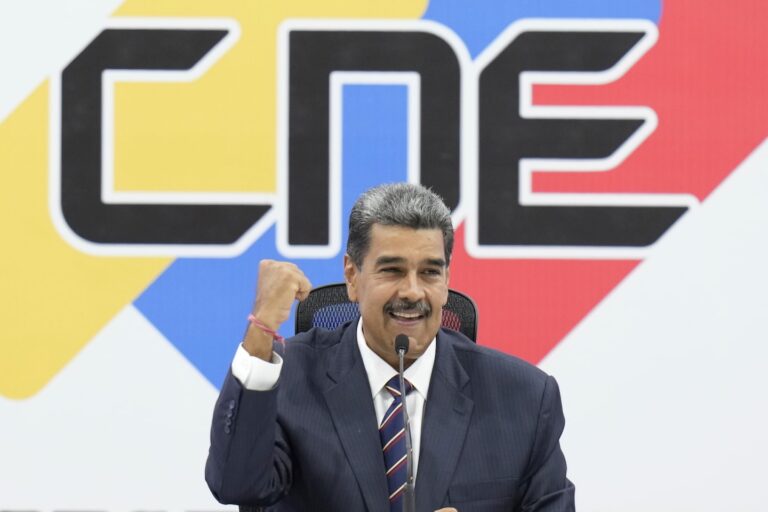As the election approached, there was a palpable hope growing in Venezuela and beyond that the brutal dictatorship of Nicolás Maduro might finally come to an end. Since seizing power from leftist populist Hugo Chavez in 2013, Maduro has wreaked misrule on this once wealthy, democratic country. Opposition leader Maria Corina Machado was not allowed to run, but the opposition coalesced around Edmundo González, a former obscure diplomat. Despite harassment and violence from the government, the opposition urged people to vote against Maduro.
On election day, millions of Venezuelans flocked to the polls, driven by their desire for a better and freer life. Exit polls showed Gonzalez winning by a landslide, but Maduro’s electoral authorities ruled the opposite, claiming that the president received 51% of the vote and Gonzalez 44%. Venezuela’s electoral system actually counts votes in two ways: through a computer system and through paper ballots. The regime’s refusal to release the paper ballots is tantamount to admitting fraud.
William LeoGrande, an expert on Latin American politics at American University, suggested to me that things haven’t gone according to plan for the regime. “Maduro’s strategy was to increase his international legitimacy by winning some credible elections, which would then see the US sanctions lifted and the economy begin to recover,” LeoGrande told me. “But the regime was ultimately faced with the possibility of either giving up international legitimacy or giving up power, and it decided to give up international legitimacy.”
The question is, what will this mean for the United States, which has long called for Maduro’s ouster with little success?
The Trump Administration imposed the toughest sanctions in history on Venezuela. These sanctions, combined with Maduro’s gross corruption and economic mismanagement, have led to an economic downturn twice as steep as the one the United States experienced during the Great Depression. Eight million Venezuelans, roughly one-third of the country’s population, have fled the country, many of them to the United States. Many more are likely to leave in the future. But no amount of economic destitution could oust Maduro.
In 2019, the Trump administration declared National Assembly President Juan Guaido the legitimate president of Venezuela. Other countries followed suit. With the support of the United States, Guaido tried to foment a popular uprising, including calling on the Venezuelan military to abandon Maduro. This failed as well, and even President Donald Trump reportedly began to question his Venezuela policy.
Still, the Trump administration continued to apply pressure, ratcheting up sanctions until the final days of his presidency. In 2020, the U.S. Department of Justice also indicted Maduro on narco-terrorism charges along with other Venezuelan officials, and the State Department offered a $15 million bounty for informants leading to his arrest. But unlike former Panamanian President Manuel Noriega, Maduro has so far eluded U.S. courts – and prisons.
The Biden administration tried a different approach, offering to ease sanctions on Venezuela’s oil sector if Maduro would allow free and fair elections monitored by the international community. Maduro failed to deliver on his promise, and U.S. sanctions were reimposed in April. But as late as Friday, administration officials continued to declare premature victory, telling reporters in background briefings that “few people expected us to get this far.” By Sunday night, when Maduro claimed an illegitimate victory, it was clear the administration had not achieved as much as it had hoped.
It’s up to Machado and other opposition leaders to respond to the government’s blatant election fraud. From the Philippines’ People Power revolution in 1986 to Ukraine’s Orange Revolution in 2004, fraudulent elections have often sparked popular uprisings. Machado must now decide whether to call people into the streets. If he does, the success of the uprising will depend on the attitude of the military. Will it open fire on its own people, as it has done in the past? Or will it finally grow tired of Maduro’s gross mismanagement?
Unfortunately, there’s little reason to expect the generals, who are beholden to the regime, to suddenly embrace democracy. But former U.S. ambassador to Venezuela Bill Brownfield told me that the U.S. cannot give up hope, no matter how many times efforts to oust Maduro fail. “The international community must now fully support the pro-democracy movement and Machado,” he said in an email, “just as it did for Nelson Mandela, Lech Walesa, and Cory Aquino.” He added that “we simply cannot accept Maduro’s election and go back to business as usual.”
Brownfield is right, but I don’t expect his strategy to bear fruit any time soon. To be sure, Gonzalez, unlike Guaidó, was almost certainly elected president, and it would make more sense to recognize him as Venezuela’s legitimate leader. But Maduro can count on support from a coalition of anti-democratic, anti-American nations led by China and Russia. Indeed, Russia, China, Iran and Cuba congratulated Maduro on his “victory,” while most European and Latin American countries condemned his apparent election fraud.
The brutal reality is that we’re stuck with failed policies in Venezuela. But no one, including me, has any ideas for a better policy. The U.S. cannot ease sanctions now, as doing so would only reward Maduro’s grip on power.
Venezuela joins a long list of rogue states that have withstood decades of U.S. pressure, including Iran, North Korea, Myanmar, Syria and Cuba. The long record of U.S. futility in Venezuela is not an indictment of Republican or Democratic administrations; rather, it is an unwelcome reminder of the limits of U.S. power. Some problems simply do not have obvious solutions—at least, no made-in-the-U.S. solutions.


